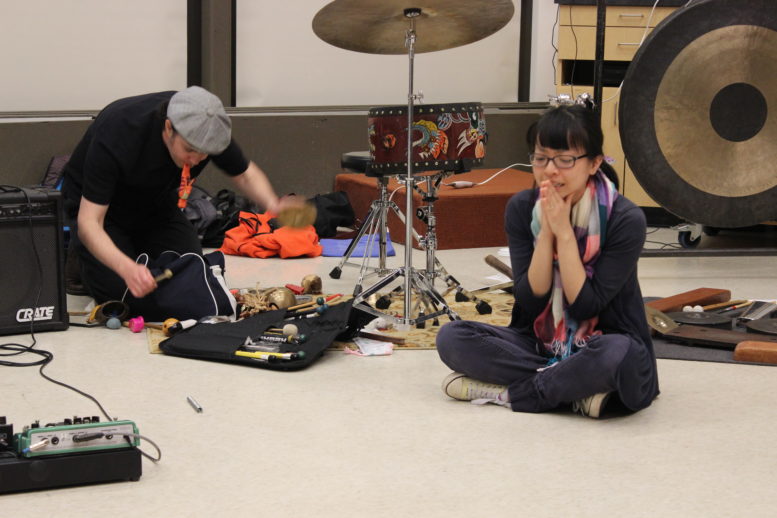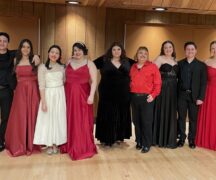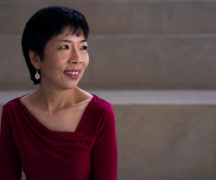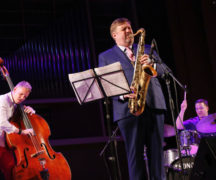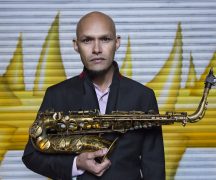By DAVID DUPONT
BG Independent News
Sitting down in Grounds for Thought with Michiko Saiki and Rob Wallace to chat about their upcoming concert, the conversation takes an unexpected turn.
Saiki, a vocalist and pianist, said in her improvised performances she aspires to the kind of profound humor experienced in the work of the writer (and BG eatery namesake) Samuel Beckett. Wallace notes that the connection is apt.
Their performances like Beckett’s writing can “very intense but funny.” A short discourse on the intersection of music, language and humor ensues. Still, Wallace said, audiences “don’t need to have all these references.”
“You don’t need to understand it to like it,” he continued. “There’s a great deal of audience interaction. This is going to be fun. … It’s not going to be complicated or over your head.”
When Saiki and Wallace perform, the music is infused with language, words emerge from lines created on the spot. The music infuses the words with surprising meanings, and the words help shape the musical lines.
Saiki and Wallace will present a free concert of improvised duets Thursday, June 9, at 7 p.m. in Grounds for Thought, 174 S. Main St. Bowling Green.
Asked how they will prepare for Thursday’s show, Wallace laughs. For each performance, he said, they bring all their musical experiences to the table. What happens next is anyone’s guess.
For Saiki those experiences go all the way back to her childhood in Japan. She studied classical piano, but wanted to be a pop, rock or jazz singer. So her parents sent her to America where she could study jazz singing.
She ended up at a small liberal arts school in Oklahoma, Northeastern State University. The school didn’t have jazz vocal courses, so she continued her classical piano studies.
Saiki has also been interested in avant garde music since childhood. She was fascinated by strange combinations of notes, but didn’t know what it was or what to call it. For her it was “creepy” music.
“I always picked things that had a more unique sound to it.” She mentioned this to her Japanese piano teacher, but studied Chopin and Beethoven.
In Oklahoma, though, when professors learned this student had an interest in new music, they rushed to fill the gaps in her knowledge. They inundated her with recordings of Milton Babbitt, Steve Reich and other masters.
This is where she learned about the composer and philosopher John Cage and avant pop icon Yoko Ono, who would shape her future work. Still her piano studies didn’t get any more contemporary than 20th century pieces by the likes of Sergei Prokofiev and Alberto Ginastera.
This interest in contemporary music brought her to Bowling Green State University. When Saiki saw all the university’s offerings in new music, especially the Doctorate of Musical Arts in Contemporary Music, she figured “there must be a great scene.”
So she came here five years ago to get a masters in piano performance, studying with Laura Melton for three year years. She continued on with the doctoral program, which she is almost finished. She’s also studied with Thomas Rosenkranz and this past year with Yu-Lien The.
Now she’s following her husband, Zach Seely, a composer, conductor and guitarist, to Leipzig, Germany, where he is studying after getting a masters in composition from BGSU.
That one of her last performances in Bowling Green – she is also performing during Art in the Park Friday – is at Grounds for Thought is fitting.
Her first show in Bowling Green was at the coffeehouse. “Have You Seen That Girl?” involved, neither playing piano nor singing. Rather she posed before the audience who attached ribbons to her white dress.
Wallace said he first learned about Saiki through publicity for that show. He wondered who this fascinating performer was. Wallace is a percussionist who has played and studied new music, jazz and Indian classical. He’s also a scholar of improvisation and teaches in the International Studies program.
He and Saiki met in the Combustible Ensemble. The experimental group was founded by Rosenkranz to perform new music works and explore the margins where written scores meet improvisation. “That’s a space where that gets to be expressed,” Wallace said.
For Saiki that means mostly singing rather than playing piano. “I’m more comfortable doing it with my voice,” she said.
Not that she restricts her contributions to music. “I’m the crazy one,” she said. If the spirit and music moves her, she will laugh, she will jump. “It’s an experimental time,” Saiki said. “A time I can be true to myself.”
This feeds into her concert piano work. “That spontaneity in improvisation can make you a better performer,” she said. At the same time, “I’m glad I have that traditional background. I can use that skill set to better express myself.”
After the semester-ending performance class for the Combustible Ensemble in May, Wallace and Saiki chatted about getting together to jam before she flew off to Germany. Wallace decided to explore presenting it as a show at Grounds. He said he appreciates Kelly and Laura Wicks’ willingness to accommodate performers. “It’s so important to have a space for this music to happen.”

